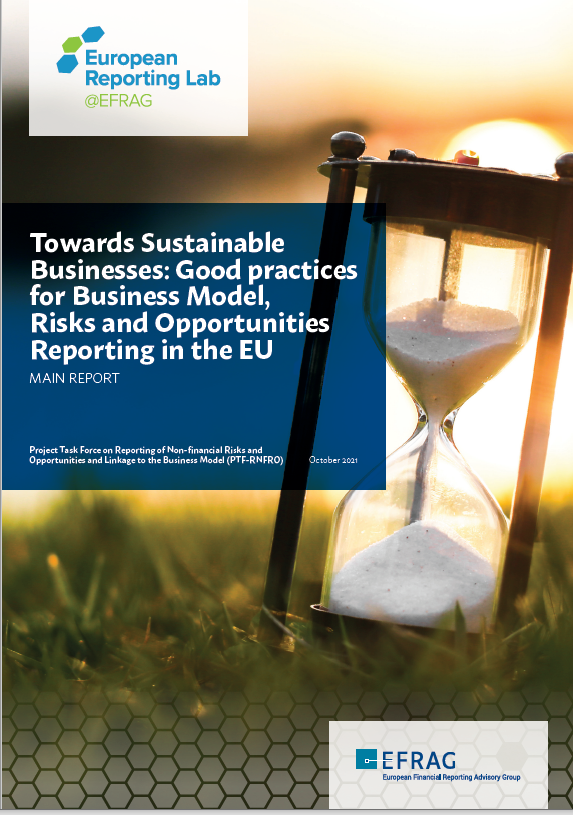The Main Report presents the state of play and the drivers of current reporting practices, the application of technological solutions, and suggests a path to improvement in the reporting of sustainability risks, opportunities and their linkage to the business model.
Following a
collaborative effort in the review of reporting practices and gathering
stakeholder feedback, the PTF-RNFRO, whose focus was on the reporting on
sustainability risks and opportunities and the linkage to the business
model- a key element of a proposal for a Corporate Sustainability
Reporting Directive (CSRD)- has published its findings in a Main Report
and Supplementary Document with good reporting practices.
The Main Report presents
the state of play and the drivers of current reporting practices, the
application of technological solutions, and suggests a path to
improvement in the reporting of sustainability risks, opportunities and
their linkage to the business model.
The Supplementary Document shares
37 examples of good or leading practices extracted from 27 companies-
with reasons why these are good practices and suggestions for
improvement.
The PTF-RNFRO deliverables identify and share
good practices aiming to help companies to benchmark and improve their
current reporting practices.
A webinar featuring keynote
speakers Pascal Durand, MEP, EP rapporteur on the CSRD and Alain Deckers
from the European Commission will be held in early November. During the
webinar, there will be a panel session involving PTF-RNFRO members to
further discuss the implications and application of their report
findings.
Jean-Paul Gauzes, EFRAG Board President and Chair European Lab Steering Group observes: “Reporting
on how sustainability risks, opportunities are linked to the business
model is necessary to understand the value creation of companies. The
extensive and detailed work by the 19 PTF-RNFRO members led by Mario and
Dawn will be a useful reference point for EFRAG’s wider sustainability
reporting work. We hope that the identified examples can serve as
inspiration for companies to improve their current reporting. I would
like to thank all project task force members for this important
contribution to the work of EFRAG.”
Mario Abela and Dawn Slevin, Co-Chairs PTF-RNFRO note that:
“Business
predicated on the perpetual consumption of materials, which is
unsustainable ecologically, socially and ultimately economically needs
rapid redress in the face of our global climate and environmental
emergency. The role of reporting has shifted to going beyond explaining
financial performance to understanding the risks and opportunities
inherent in business models driving those results, encompassing both
people and the planet. Profits can no longer be disconnected from the
impacts and dependencies of business models. Our work is intended to
influence practice by encouraging preparers to provide a much clearer
‘through-line’ between financial and sustainability information using
the business model as the mechanism for achieving that.
”
To come to our conclusions, we have drawn on insights from a breadth of
stakeholders to whom we owe a debt of gratitude. Foremost, we would
like to express our immense thanks to all the PTF-RNFRO members for
their expert insights, generosity of time despite the limitations
arising from the pandemic, and constructive and open-minded approach
throughout the project.”
Below are details of the report:

EFRAG
© EFRAG - European Financial Reporting Advisory Group
Key

Hover over the blue highlighted
text to view the acronym meaning

Hover
over these icons for more information

Comments:
No Comments for this Article